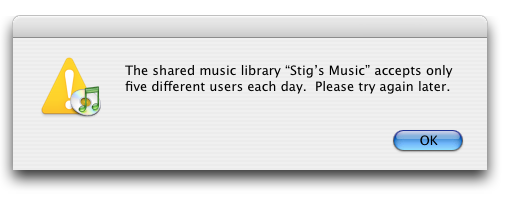2005-03-16
Obscure Restrictions and OurTunes DOS
It's taken a month or two for this to bubble into public consciousness, but iTunes 4.7.1 has a nasty limit on its music sharing. Previous versions of iTunes 4 limited you to five simultaneous connections to a shared library, but this has now been changed to five "different users" a day:

I'm not the first person to discover this (that may well be the author of this forum post, although Neil Crosby's writeup was the first I saw). However, it does affect me more than most, because I strongly suspect the behaviour change is entirely to try and get around the use of shared library copying applications like OurTunes and my own Blue Coconut.
Blue Coconut certainly, and the other looks probably, generate a new connection to the iTunes share. If you're copying from one machine, that used to mean that, while you were doing so, they could only share to four "real" users, but I never really felt the need to spell this out.
Additionally, OurTunes tries to connect to any share it can see. Run five copies in a big enough university network, and you've just closed down iTunes sharing for everyone.
Of course there are ways around this. You can run your own DAAP server (a topic that I'm intending to write about in more depth, but for now your magic keywords are mt-daapd, Music Publisher and accessTunes), but for most users that's not going to mean anything. On the other hand, except for colleges, I wonder how often this is a problem.
Copying from iTunes shares is also, of course, not something Apple wants to be associated with. It's surprising they changed this rather than the DAAP authentication. Mind you, oddly, this restriction will be much harder to work around than a MD5 change.
I started drafting this yesterday, and in the meantime Cory Doctorow has waded in with another of his "all DRM is bad! Apple are evil! Don't trust them!" rants. I question a lot about this, but I'll confine myself to one obvious point. I didn't pay for anything to do with iTunes. It's free, it's running on an OS that came for free with my computer, and it shares (I don't like the word streaming: another rant) songs that I didn't pay to have on my computer. Apple may be removing a feature, but it's a feature that nobody else is even close to implementing. Sure, it kind of sucks, but no more than that.
2005-03-16
Simon
I would venture a guess that there are other forces at work causing Apple to change these rules too, and I wouldn't rule out ASCAP 's recent realisation that networked applications fall under their jurisdiction.
Sharing songs to unlimited numbers of users across a large network would appear to fall under the definition of ASCAP's new "Interactive" licence, for example. If Apple's been getting rumblings from ASCAP, either that they'd pursue iTunes users ("broadcasters") or Apple themselves (as broadcast facilitators) for licence fees, that would represent a very powerful incentive to limit the sharing feature below any risk threshold.
There's an argument that ASCAP's licences only apply to the Internet in general, but that misses the point. The new "internet" licences were designed to clarify *existing* fee obligations in internet-specific cases. The obligations apply any time you're sharing music with a disparate group of people, from the radio playing in your hairdresser's shop right up to, well, potentially iTunes.
Yes, iTunes has always limited shares to 5 concurrent users, but that still represents a lot of potential users listening to a lot of music over the course of a day, particularly on large office or campus networks where iTunes users regularly number in the hundreds.
What we may actually be seeing in this latest update is the result of a compromise between Apple and the music companies.
Apple are playing a constant, dangerous game with iTunes - attempting to push the boundaries of what they can do with these technologies, without stepping on the music industry's toes. They have no choice - too much toe-steppage and they'll lose the support of big music publishers. Bye-bye iTMS.
Of course, it would be nice if we lived in a world with no content restrictions, but in bitching about "Apple removing our rights" without even pausing to examine the potential reasons, commentators like Cory are showing severe short-sightedness.
2005-04-25
Frederic
I just figured this out on my university network.. holy shit its a pain... I was confused as to why suddenly most user's libraries were inaccessible in myTunes... Something I've been looking at regularly, because there is this one bad that noone has, and I cant buy their music anywhere... so weekly or so I pop up the program to see if miraculously someone might have put it into their itunes... I have my own music, so I rarely use itunes to play shared libraries... I clicked on one of the "dead" libraries from mytunes, In itunes, and here I see the error message. Previously I just assumed the university changed the network limitations they had in place... (I can't see everyone on my network, just a group of people based on when they registered their machines...)
Its very frustrating.